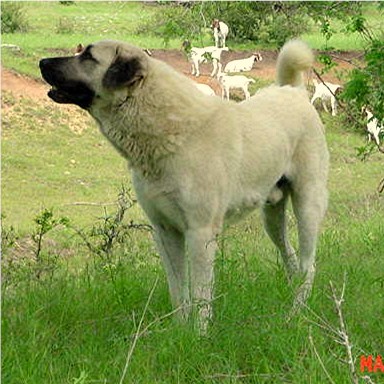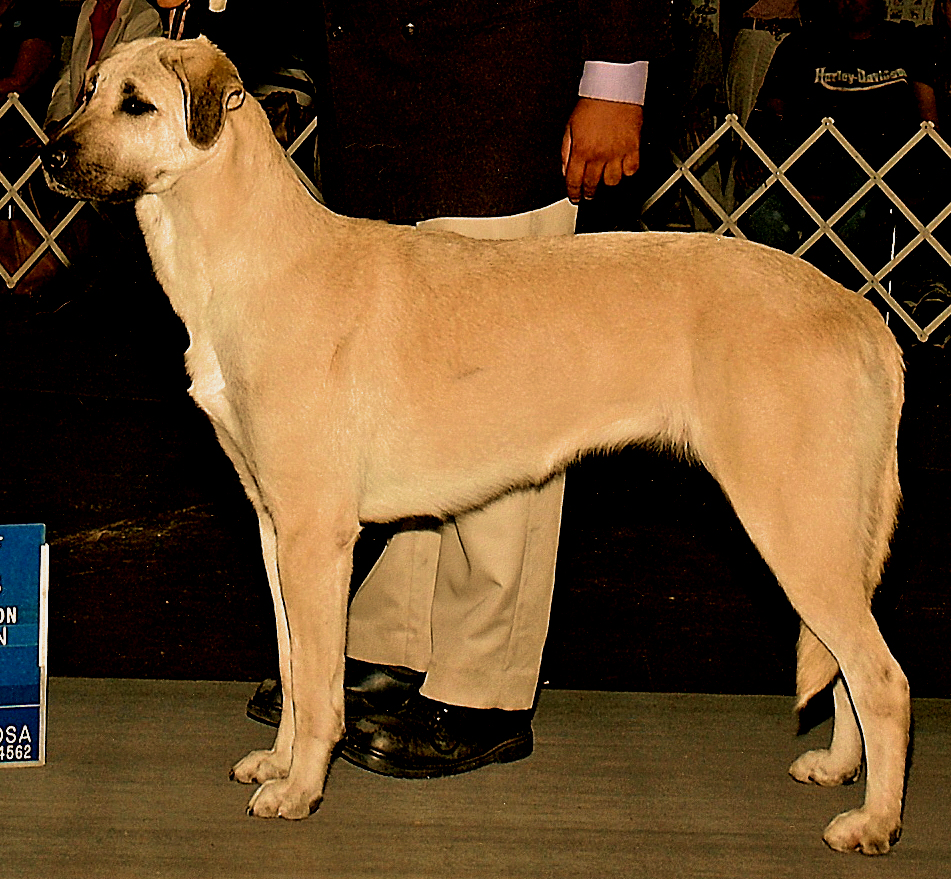|
By Erick Conard, Lucky Hit Ranch, Leander, Texas |
||
 LUCKY HIT Shadow Kasif (CASE) Worked in the big pasture for 13 years at Lucky Hit Ranch And produced 11 Champions in his two litters with CHAMPION Inanna BETHANY Bay of LUCKY HIT (BETHANY) |
||
|
What are some factors to consider as you think about breeding your female Anatolian, a female with a good conformation, a wonderful temperament, and hopefully has proven herself to be great with her animals? First, it is vital that you pick a superior male (superior both in conformation and working ability). Next you must consider the genetic health of both sire and dam. The criteria you use for selecting the male should be specific to the female being bred. Don't pick a male who has the flaws you see in your female. Pick a male whose traits compliment your female. Hopefully, this will result in some pups who are superior to both the male and the female. I believe that raising Anatolians in the pasture with all the stresses found there is important because all breeding Anatolians are potentially the parents of actual working Anatolians. A dog raised indoors with heating and air conditioning faces far fewer physical challenges than a pasture dog, which must face extremes of heat and cold, a wide variety of predators and the fleas and ticks they bring in, fire ants, snakes, dealing with their sometimes unruly and aggressive charges, poor and uneven footing, and soil and fecal bacteria in the pasture environment, to name a few. Anatolians raised with the extreme physical and emotional stresses of the pasture are more likely to express hidden genetic flaws when exposed to pasture stress than those Anatolians raised in a physically comfortable home environment. You may find that it is difficult to obtain accurate genetic information from most stud owners. While they are quick to share positive genetic information, I have not found many owners willing to share (or knowledgeable about) negative genetic information. One way I identify excellent genetic health on my own is by determining that a specific dog and his parents have actively worked as a pasture flock guardian for years. Beware of stud owners who claim their dog works 24/7 in the pasture guarding sheep and/or goats in a predator rich environment but in reality lives in the house and only occasionally visits the pasture to have pictures taken with sheep and/or goats! House pets are NOT proven working Anatolians! A working dog who has been healthy throughout his years of work in the pasture and whose working parents have lived a long and healthy life is likely to be genetically healthy and pass those genes on to his offspring! Unhealthy guardians cannot tolerate the physical challenges found in real world flock guardian settings and cannot guard successfully into old age. Therefore, when considering the genetic health of a potential stud dog, I place a high value on those dogs with years of flock guardian service in a real world pasture setting who have remained healthy and sound. If the potential stud is young, I look to his sire and dam to verify they have met that genetic criteria! The single most important factor in selecting a stud dog for your female is to insure that you are obtaining genetics from an Anatolian with proven superior working ability! I believe it is unwise to purchase a pup from a pair of Anatolians with unproven working ability, especially if this type of breeding has been happening for more than one generation! Show wins do not indicate the quality of working behavior, demeanor, and ability the pup might have. In fact, some irresponsible judges will pick traits that are antagonistic to excellent working behavior but look great in the show ring for a generic show dog! Luckily, some judges do understand how important it is to select only Anatolians with correct working behavior and demeanor and do their very best to select only Anatolians with behaviors appropriate to the pasture even when those pasture behaviors seem counter-productive in the show ring! Some improper traits well meaning but ignorant judges have advised me to "train" my dog into displaying in the ring include high activity playful behavior (which goats and/or sheep hate), lack of proper wariness toward new things and new people (necessary for good guardian responses in the pasture), a lack of off-territory shut down (essential for vet visits and other trips off the ranch), tail held high in the ring (which is a signal to the flock that the Anatolian believes danger is near but in the ring the Anatolian should be in off-territory shut down mode with the tail held low, indicating a non-threatening emotional state), and many other subtly incorrect Anatolian behaviors in a show setting. Because such a large number of AKC judges still select for generic show-dog behaviors, it is my experience that in order for the Anatolian with good working genetics (non-generic show-dog behaviors) to win over an Anatolian with poor working genetics (generic show-dog behaviors), the working Anatolian must have a clearly superior conformation! In the long run, AKC judges who favor generic show dog behaviors are contributing to ruining another breed by causing show-focused Anatolian breeders to select for behaviors and traits antagonistic to the behaviors and traits required to perform livestock guardian duties. If my situation didn't allow me to prove my Anatolian had superior working ability and I had a female I thought might produce excellent pups, I would only consider breeding to a male proven with sheep and/or goats in a predator rich environment that also had a superior conformation, excellent health, an excellent temperament, a wonderful demeanor, and an amazing ability to interact with his flock in a calm and reassuring manner! By selecting this type of superior working male, I would know I at least made an attempt to maintain excellent working ability in the pups I produced! It is important to remember that Anatolians were bred for thousands of years under harsh and difficult situations to faithfully guard their sheep and/or goats in a predator rich environment. In my opinion, "breeders" who don't care enough about Anatolians to ensure those amazing traits are faithfully passed on by only breeding carefully selected proven superior working Anatolians should seek another breed. I generally recommend they would most likely be happy with Golden Retrievers. It is a wonderful breed and the "breeders" would not have to contend with the pesky traits required in a superior working Anatolian! |
 CHAMPION Inanna BETHANY Bay of LUCKY HIT (BETHANY) Worked many of the pastures at LUCKY HIT RANCH for almost 12 years And produced 11 Champions in her two litters with LUCKY HIT Shadow Kasif (Case) |
Link to Lucky Hit Ranch Main Home Page
Link to Lucky Hit Ranch Anatolian Page